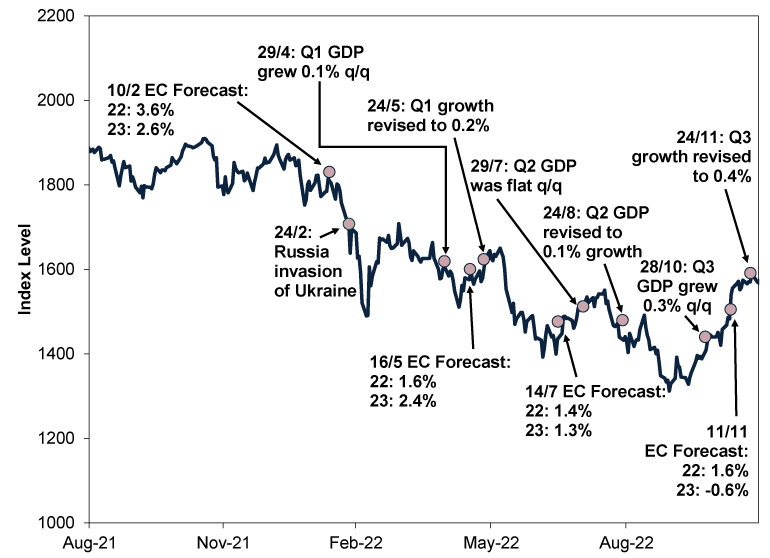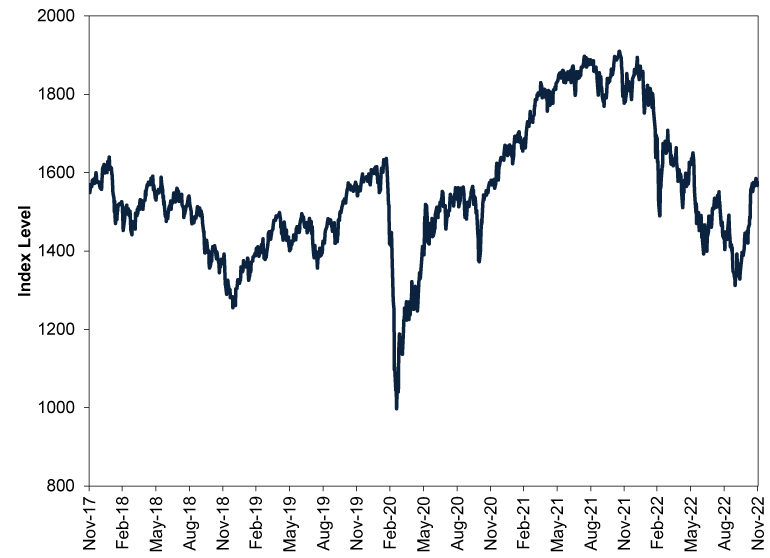Personal Wealth Management / Market Analysis
What to Make of German Recession Chatter
As recession forecasts mount, all eyes are on Europe’s largest economy.
Last Friday, Germany released its revised estimate of Q3 gross domestic product (GDP, a government-produced measure of economic output), and its 0.4% q/q growth was better than the initial estimate announced in late October—which also beat expectations.[i] Whilst backward-looking Q3 growth doesn’t mean Germany will sidestep recession (a broad, economy-wide decline in activity), our review of recent economic indicators suggests reality has been faring better than most anticipated in financial publications we monitor. This type of positive surprise often underlies a stock market recovery, based on our research.
Germany’s initial GDP estimate doesn’t share industry or other component specifics beyond statisticians’ general commentary about what drove growth, but the revised estimate includes more details. As national statistics agency Destatis hinted at earlier, household spending was a key contributor, rising 1.0% q/q.[ii] The agency noted sharp price increases didn’t dissuade consumers from spending in Q3—especially on travel, with nearly all of the country’s COVID restrictions removed.[iii] Though gross fixed capital formation (a measure of investment that includes businesses and government entities) fell -1.4% q/q in construction, investment in machinery and equipment was up 2.7%.[iv] Trade was resilient, too, with exports (2.0%) and imports (2.4%) both up on a quarterly basis—a sign of solid external and domestic demand, in our view.[v] Considering these data are all adjusted for inflation (rising prices across the broad economy), activity appears to have held up despite high prices, in our view. On a sector basis, manufacturing output increased, as did most services industries.[vi] German Q3 GDP also climbed above its pre-pandemic level for the first time, which we think is a fun, if arbitrary, milestone.[vii]
In our view, the data are notable considering we have seen many economists argue Germany is on the precipice of a recession, if not already in one, primarily tied to the ongoing economic ripples from Russia’s invasion of Ukraine. Moscow responded to Western sanctions by throttling natural gas flows to Europe, hurting Germany in particular. Not only was Russia Germany’s top supplier pre-invasion, but the country depends on natural gas for energy and feedstock to power its large chemicals industry.[viii]
Now, our review of the data suggests restricted energy supply has weighed on the economy. Though the Q3 GDP report didn’t provide detailed figures, Destatis noted output fell in energy-intensive manufacturing categories, including chemicals and chemical products and basic metals.[ix] That is consistent with Germany’s industrial production gauge, as the chemical and pharmaceuticals products category has contracted on a monthly basis in seven of nine reported months.[x] But so far, we have found that less commodity-sensitive industries within manufacturing have more than picked up the slack.[xi] If chemical companies’ situation worsens beyond electrical and computing devices and equipment manufacturing’s ability to offset their declines, then manufacturing output could turn negative. But we think it is worth noting that the potential hit to Germany’s industrial sector that commentators we follow have warned about hasn’t derailed broader growth thus far.
That said, a German recession also wouldn’t shock, in our view. Late last year, economists discussed the prospect of recession tied to energy supply concerns, elevated inflation, ongoing COVID restrictions and supply chain bottlenecks.[xii] We heard that chatter increase after Russia invaded Ukraine and the West responded with sanctions, and based on our coverage of financial headlines, many experts consider a recession next year to be a foregone conclusion. But we don’t think this scenario is sneaking up on stocks.
In our view, German stocks’ behaviour over the past 12 months has been consistent with an approaching recession. As Exhibit 1 shows, after their November 2021 high in euros (used here to avoid currency skew), German stocks fell -30.8% through the end of September.[xiii] (They have since clawed back some of that decline.)[xiv] Over those 10 months, the European Commission (EC, the EU’s executive arm) has steadily lowered its German economic forecasts.[xv] Per its latest estimate, German GDP will grow 1.6% in 2022 and contract -0.6% next year.[xvi] But in our view, German stocks haven’t waited for statistics agencies or supranational organisations to officially confirm whether the economy was in recession or not: They appear to have pre-priced the weakness.
Exhibit 1: German Stocks Don’t Appear to Be Ignoring Weak Economy Talk

Source: FactSet and European Commission, as of 29/11/2022. MSCI Germany IMI Index returns in euros with net dividends, 31/8/2021 – 28/11/2022. IMI stands for Investable Market Index, which are gauges covering 99% of the publicly traded stocks in a given region. Returns in euros to avoid currency skew, and currency fluctuations between the euro and pound may result in higher or lower investment returns. European Commission releases its annual growth forecasts four times a year. Please see the Annex at the end of this article for a longer-term version of this chart.
We have found the EC’s view isn’t an anomaly, either. Back in August, the Bundesbank, Germany’s central bank, said declining output in the winter months looked likely.[xvii] The following month, the Organisation for Economic Co-operation and Development (OECD) forecast a GDP contraction in 2023, as did German multinational Deutsche Bank.[xviii] The IMF followed suit in October with its own 2023 German recession call.[xix] If the data eventually confirm a downturn, we think stocks likely already reflect the impact to a great extent. In our view, reality would have to turn pretty bad to negatively surprise markets. But if the data end up even a tad better than thought, that outcome would likely count as a positive surprise, in our view. Between those two scenarios, our research and observations of the data thus far suggest to us the latter is more likely.
This doesn’t mean a recession, if one materialised, wouldn’t create hardships for people and businesses. It likely would. But in investing, we think it is critical to view the economic environment as our research finds stocks do: Is anything here a surprise? If it isn’t, stocks have likely digested and reflected the news already. With the numbers implying to us that Germany’s economy isn’t in the dire straits many think, reality seems likely to positively surprise, in our view.
Annex
A Longer Look at German Stock Returns

Source: FactSet, as of 1/12/2022. MSCI Germany IMI total return in euros with net dividends, 30/11/2017 – 30/11/2022. Returns in euros to avoid currency skew. Currency fluctuations between the euro and the pound may result in higher or lower investment returns.
[i] Source: FactSet, as of 2/12/2022.
[ii] Source: Destatis, as of 28/11/2022. “Gross Domestic Product: Detailed Economic Performance Results for the 3rd Quarter of 2022,” Staff, Destatis, 25/11/2022.
[iii] Ibid.
[iv] Ibid.
[v] Ibid.
[vi] Ibid.
[vii] Ibid.
[viii] “Russia Is Giving German Industry a Slow Puncture,” George Hay, Reuters, 27/7/2022. Accessed via Nasdaq.com.
[ix] See note ii.
[x] Source: FactSet, as of 29/11/2022.
[xi] Ibid.
[xii] “Europe’s Biggest Economy Is on the Brink of a Winter Recession,” Charles Riley, CNN, 14/12/2021.
[xiii] Source: FactSet, as of 29/11/2022. MSCI Germany IMI Index returns in euros with net dividends, 4/11/2021 – 29/9/2022. Currency fluctuations between the euro and the pound may result in higher or lower investment returns.
[xiv] Ibid. MSCI Germany IMI Index returns in euros with net dividends, 30/9/2022 – 29/11/2022. Currency fluctuations between the euro and the pound may result in higher or lower investment returns.
[xv] Source: European Commission, as of 29/11/2022.
[xvi] Ibid.
[xvii] “German Recession Increasingly Likely, Bundesbank Says,” Staff, Reuters, 22/8/2022. Accessed via Yahoo! News.
[xviii] “Energy, Inflation Crises Risk Pushing Big Economies Into Recession, OECD Says,” Leigh Thomas, Reuters, 26/9/2022, accessed via Yahoo! Finance, and “Deutsche Bank CEO Warns Recession Is Inevitable, Says Germany Must Cut Reliance on China,” Elliot Smith, CNBC, 7/9/2022.
[xix] “IMF Says Germany and Italy to Slip Into Recession in 2023,” Staff, Deutsche Welle, 11/10/2022.
Get a weekly roundup of our market insights.
Sign up for our weekly e-mail newsletter.

See Our Investment Guides
The world of investing can seem like a giant maze. Fisher Investments UK has developed several informational and educational guides tackling a variety of investing topics.




